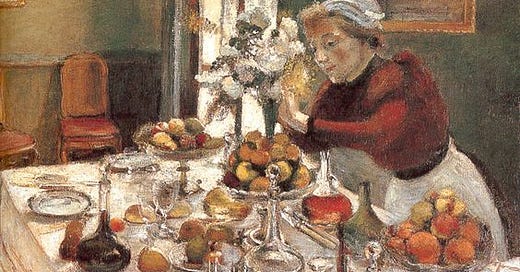There have never been so many temptations to fill up an idle moment. Whatever the time of day, push notifications, subscriptions, appointments, emails, messages, Facebook statuses, the number of Covid cases, YouTube recommendations—everything bombards our attention. Information and entertainment seep into all parts of our life, except, perhaps, for dinner.
Dinner is one of the last havens of quiet. It’s the one event where you can still nag people to put away their devices. Though we come together for the simple animal activity of eating, we’re also given a chance to talk, laugh, and gossip with whānau and friends. We are given a chance to see their faces and smiles, which is becoming a rarity now that our lives are increasingly indoors and digitally mediated, with less need to talk to others. Yet a common good requires a common life, and the basis of this is our relationships with other people. Very often, that begins with sharing food.
Eating together also gives us the opportunity to say grace. Or, to put it another way, to reflect on where the kai came from and be thankful for it.
Because of global supply crunches and bog-roll hoarders, we have seen, for the first time in ages, empty shelves in the supermarkets. We used to associate this image with failed states. Now it is here to remind us that everything has a cost.
What is the cost of a frozen pizza? Tomatoes must be grown in Italy and stored in cans made from aluminium, smelted by Canadians from bauxite pulled out of the ground in the highlands of Guinea. Animals must be raised and killed, their corpses smooshed into sausages. The pizza must be assembled, cooked, and frozen. It is sealed into a box that is wrapped in plastic made from polymerised Saudi crude oil. An Australian supermarket ships it around the world. Finally, a New Zealand cashier sells it to me, so I can take it home and stuff it in my gob.
Beyond the final price at the checkout, there is a cost in all this. Workers have to be paid. Labour conditions should be inspected. Trade treaties must be negotiated. Petrol is burnt to ship and fly and truck it all around the world. There is a health cost in the preservatives needed to stop the kai rotting on its journey. There is a cost in my plastic pizza wrap—which, in all likelihood, will probably flap around in a landfill for the next thousand years before it decomposes.
When does this cost outweigh my convenience? We have largely been able to ignore this question. Growth never seemed to have any limits.
But we live on a finite earth. The icebergs are melting and the oceans are ribboned with plastic. To even begin to reckon with this requires us to to acknowledge what we are taking—and from where.
Grace is a gentle reminder to consider all of this. To make any change in the world, no matter how small, we must think about how we live—and then change it.
One of the most well-known karakia for kai is the one that begins:
Nau mai e ngā hua
o te wao,
o te ngakina,
o te wai tai,
o te wai Māori.
My translation is:
We welcome the fruits
of the forest,
of the gardens,
of the sea,
of the fresh waters.
Each line acknowledges where the kai on the table came from: the forest, the garden, the sea, the river. If we wanted to say the karakia properly, we would acknowledge the forest, the river, etc. only if we had stuff on our plate that actually came from there. This invites a deeper understanding of our food and where it comes from.
Supermarkets make it difficult for us to do this (“I’d like to acknowledge aisle 5 for tonight’s meal…”). Yet sound ecological living requires us to both produce more efficiently and consume more prudently. Rebalancing the equation begins with the question: where does it come from?
Grace is not just an old-fashioned chant that stands between you and your tucker. It draws our attention to many things that are essential to life. Often, we push these aside in the haste to be entertained or occupied.
If we never stop to acknowledge these things, we cannot be at peace with the world around us. We must either live in a state of indifference or be eaten at all times by a swarming guilt for how things are. Neither is good. Both are a form of inaction. Both ask the earth’s needs to yield to my human right to scoff down a frozen pizza on Friday night.
By saying grace I am given back time. I consider the things that are good, as well as the things that are bad. By acknowledging them, I am able to hold them at a distance from the current moment. It is a brief moment to thank the earth while forgetting its troubles—if only to better enjoy the company of friends over food.




